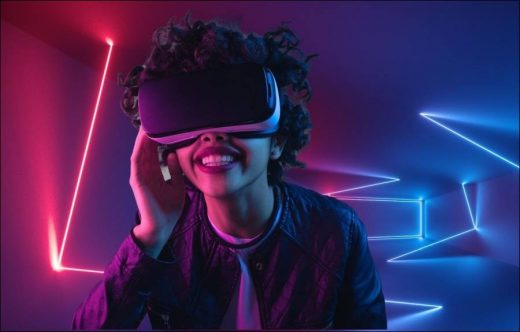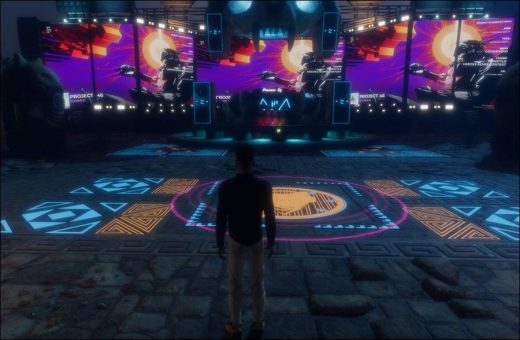Before the new big ideas in technology (the “next big thing”) are used in real life, they often come into our lives in trailers. In this process, without adequate explanation of technological concepts, excessive use becomes jargon and an expectation (hype) about technologies occurs.
We have observed this situation many times in terms of developing new technologies: As in cloud computing, artificial intelligence, blockchain and 5G… In the last period of 2021, a similar development took place in terms of the metaverse, and the concept of metaverse came out of the shadows and entered the mainstream dictionary.
Gartner, one of the leading research firms in the field of IT, describes the transition to the metaverse as “as important as the transition from analog to digital”; that is, we are witnessing a new digital revolution in the period we live in. Metaverse is basically emerging from necessities and needs. On the one hand, we spend time in digital channels and online services.

While time is constantly increasing, we are rapidly copying our routines, interests and rituals to digital worlds. Virtual and physical realities are intertwined and make the digital world hyper-realistic. All these developments create a “new virtual life” encompassing digital properties, relationships and social spaces. ecosystem”. We call this new era of digital platforms the “metaverse”.
Metaverse will be the “successor of the mobile internet”. However, as I mentioned before, this transition will take place “first slowly, then suddenly”. As different products, services and capabilities integrate and come together, the metaverse will gradually be built over time and the concept of the metaverse will become concrete.
Some indications that the Metaverse is starting to emerge have started to appear over the past year: incremental innovations focused on virtual reality (VR) and augmented reality (AR) technologies; the proliferation of gaming platforms as social and cultural destinations and the competition of companies to claim the metaverse from their own perspectives, etc.
So what can we use as the common metaverse definition that everyone will adopt?
Although the definition of metaverse is made in different ways and today’s definitions are still very general and far from realistically visualizing the metaverse, some definitions have started to come to the fore: “Digital layer of our daily life”, “an interconnected and unlimited virtual world”, “ like the virtual world where we will create our second lives and spend time in” or my favorite “digital twin of the physical world”.
So, when will we fully live in the “metaverse” or move on to the “metaverse”?
In an article published in the New York Times in July 2021, “when exactly will we move to the metaverse” was questioned and the following determinations were made: “Those who deal with cryptocurrencies say that they are building the metaverse. Gamers say they’re already living in it (72% of the $10.4 billion investment in the metaverse in 2021 went to gaming companies (Source: Crunchbase)).
The art world, on the other hand, thinks that it has started to make money from the metaverse…” In this direction, if you have an NFT work, even if you have a small amount of crypto money, it can be said that you are a part of the metaverse experience. If you’ve ever attended a business meeting or a party using a digital avatar, you’ve stepped into the metaverse. In fact, if you’re working on blockchain, NFT, virtual or augmented reality, you might even have a role in building the metaverse.
Race for space in the Metaverse…
Exactly 30 years after it was first described in Neal Stephenson’s 1992 sci-fi novel Snow Crash, the metaverse is taking shape before our eyes. Facebook’s name change to Meta at the end of October brought the trend to the attention of a much wider audience. Suddenly, retail giants are racing to explore how they can leverage the “metaverse” in their future communications and sales strategies. Companies began to research the impact of the metaverse on business processes and to test a number of applications in this direction.
In the “metaverse trend report” published by Wunderman Thompson last December, the race of tech giants in the metaverse space is summarized as follows: “In August 2021, TikTok announced that it has established its own AR development platform. According to a report published in March 2021, Facebook currently has 10,000 AR- and VR-focused employees (almost one-fifth of all Facebook employees).
A new metaverse division was also established within the company in July 2021, after Facebook CEO Mark Zuckerberg loudly announced that Facebook’s future lies in being a metaverse company. Also in July 2021, Snap acquired a company that helps brands create 3D virtual versions of their products (the company is also making a splash with its investments in AR-focused smart glasses). Google’s device director said in a statement that the Google Pixel 6 will create “breakthrough” AR experiences.
Apple is said to be developing a VR headset that could go on sale in 2022 (Apple’s acquisition of VR company NextVR in 2020, at the start of the pandemic, has increased speculation about its plans to develop AR and VR technologies in new product categories). Alibaba has also recently launched an NFT auction site, and last week it announced it has launched a new company to test more of the metaverse’s gaming potential. Microsoft CEO Satya Nadella said in August 2021 that Microsoft aims to create an “enterprise metaverse.”
Game companies have already started to make room for the metaverse on their platforms. In April 2021, Epic Games completed a $1 billion funding round to “support its long-term vision for the metaverse.” In August, Nvidia unveiled its platform, which it calls the “metaverse for engineers.” Launched in beta in December 2021, the platform will connect engineers, designers, and autonomous machines to create digital twins and industrial metaverses.”
There is a high interest in Metaverse from many different fields, from the world of investment to real estate and law. In June 2021, venture capital firms Roundhill Investments and Matthew Ball launched a metaverse mutual fund. In March 2021, Metaverse Group announced plans to launch Metaverse REIT, a first-of-its-kind real estate investment trust for virtual assets. And in May 2021, Reed Smith, a law firm, published a legal guide to the metaverse, covering legal issues ranging from intellectual property to privacy to competition, which the firm calls “the greatest industrial revolution the world has ever seen.”
How will this affect consumer behavior and lifestyles as companies compete to enter the metaverse?
While some of the key tools and infrastructures that will form the building blocks of the metaverse, including trust in technology, are already in place, only 38% of global consumers have heard of the term (I think it’s pretty good for a technology that’s so new and has a speculation on its definition). ratio).
Now, people are not only socializing in digital spaces, but also working, shopping and discovering products there. For this reason, brands will need to be a part of digital spaces that attract people’s time and attention, metaverse can be an ideal platform for this. To engage with consumers in a meaningful way on the Metaverse, brands will need to think beyond entertainment and play. Processes in the virtual world will also have real-life consequences, and the way physical products are tested, produced and sold will change.
It’s much sooner than you might think, when you wake up in the morning to choose an outfit for your avatar before you set off in your virtual car. Many players have already started doing this. This will be out of the game as we begin to see interactive experiences with daily functional value…
In February 2021, NFT marketplace RTFKT sold 600 pairs of digital sneakers in just seven minutes, generating $3.1 million in sales. In June 2021, “only one” digital Gucci bag was sold on Roblox for over $4,000. Consumers attribute increasing value to digital assets by replicating their physical daily habits in the virtual world. Therefore, it is predicted that the future of consumption lies in virtual goods.
Visits: 181




